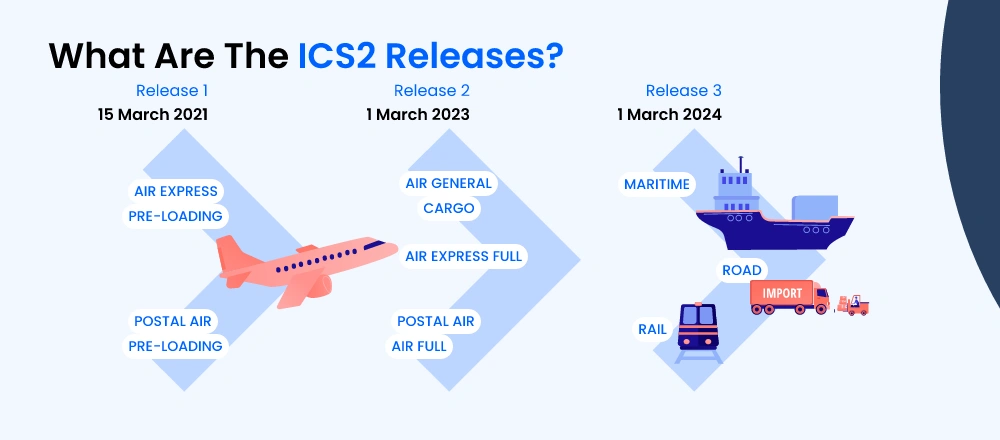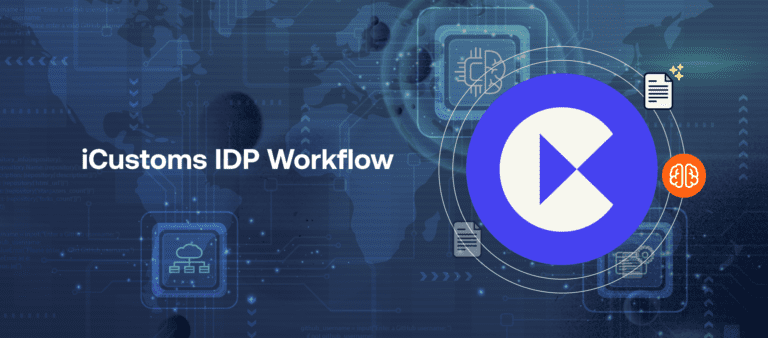Fast & Accurate ENS GB & EU ICS2 Solutions Built for You.
Import Control System (ICS2) Fundamentals and Their Effect on Global Trade
-
Freya Jane
- Director of Customer's Success
A complete framework of policies, practices, rules, and regulations implemented by the state to import items towards a specific area or country efficiently is called an import control system.
The absolute goal of this is to ensure the protection of imported items, the safety of domestic enterprises, and quality assurance by remaining compliant with global trade agreements.
Significance of ICS
An import control system (ICS) is a framework of laws, procedures, and legislation that a government or other organisation applies to manage and verify the importation of commodities for a specific country or region.
An import control system may also be called an import administrative program. Its main goals are to protect domestic industries, ensure import quality, and comply with international trade agreements.
This system helps oversee and control the flow of goods entering a particular area, to balance commercial interests and compliance with regulatory requirements.
ICS2 stands for Import Control System Release 2 (ICS Release 2). iCustoms has introduced its AI Customs Software Solution for businesses to comply with ICS2, ensuring ease of cross-border trade effectively.

What do you need to know about the Import Control System (ICS2)?
If you are going to trade with the EU, you must comply with the ICS2 requirements. Economic Operators (EOs) must submit Entry Summary Declarations to ICS2 with safety and security data (ENS).
Not all EOs will be required to begin filing these declarations simultaneously. It is related to the three release dates of ICS2 and will depend on the services they offer in the global movement of goods (15 March 2021, 1 March 2023, and 1 March 2024).
In addition to pre-loading filing requirements, all goods transported by air in postal, express, and general cargo consignments will be subject to full pre-arrival ENS data requirements.
Businesses trading with the EU must now comply with the ICS2 requirements. Economic Operators (EOs) must submit Entry Summary Declarations to ICS2 with safety and security data (ENS).
As of the 1st March 2023, all economic operators outside the EU that move goods to or via the European Union by air must comply with Import Control System 2 (ICS2). On March 1, 2024, this will be expanded to include trade via sea, road, and rail transportation.
Compliance factors & requirements of Import Control System Release 2
Before using ICS2, some essential factors should be considered, such as:
Goods classification:
The Harmonised System (HS) code used to classify imported goods must be used precisely. Tariffs and taxes specific to these goods are identified using this code.
Compliance with rules:
Health, safety, and environmental issues are only a few of the many areas European Union legislation covers when importing goods. In some cases, this may necessitate completing a certification program or achieving a set level of performance.
Conditions for confinement:
The European Union may impose quarantine laws on imported products to protect European agriculture and the environment.
Restricted goods:
It is against the law to bring restricted goods into Europe, such as illegal narcotics, weapons, and certain risky chemicals.
Tariffs and taxes:
Before customs release, imported goods may incur customs duties and taxes. Goods are subject to customs duties and taxes, and one needs to pay them before releasing them.
Paperwork:
Documentation is an essential component in customs clearance. Import documentation, if not done correctly, causes delays, rejections, and other problems.
Necessary authorisations and licenses:
Some goods, such as pharmaceuticals, weapons, and hazardous materials, require a license or permit for import into Europe.
Key Requirements of ICS2 R3
- Increased Scope: The new release increases the number of economic operators that must send ICS2 Entry Summary Declarations (ENS). This includes not only traditional importers and exporters but also postal and express carriers, logistics providers, and, in some cases, final consignees.
- Enhanced data requirements: In their ENS submissions, economic operators are now required to submit a more thorough dataset. This contains comprehensive details about the items being shipped, the parties involved, and the mode of transportation.
Benefits of ICS2 Release 3
ICS2 assists customs officials in recognising possible security risks and taking the necessary action by offering advance information on cargo shipments.
Customs clearance takes less time and effort thanks to the automated data exchange and simplified procedure.
Delays and penalties are less likely to occur when ENS submissions are made on time and accurately.
By giving more insight into the flow of goods, the system facilitates improved planning and decision-making.
Want to learn more about ICS2 and its releases? Click here
What controls apply to the Import Control System?
Tariffs, quotas, licenses, and bans are just some ways to control imports. Tariffs, in particular, are taxes that are put on goods that are brought into the country.
This protects domestic businesses by making imported goods more expensive. Import quotas limit product quantities. This policy can protect domestic industry or ensure product availability to fulfil demand.
Importers are required to obtain government authorisation before bringing certain items into the country, as this is a requirement of licensing. However, bans limit the importation of specific products for safety or other legitimate reasons.
The EU ICS2 import control system has brought requirements to be fulfilled to make trade safe and secure. The world of customs clearance is now in a fast-paced revolution phase, and that’s why release 2 of the import control systems is also known as ICS2 customs.
How ICS2 Impacts International Trade: A Two-Sided Coin
The EU’s Import Control System 2 (ICS2) has undoubtedly shaken up the world of international trade, particularly for businesses dealing with air cargo. Launched in phases, it aims to enhance security and safety around imported goods while streamlining legitimate trade flow. However, its impact on trade remains a complex tapestry woven from both opportunities and challenges.
Enhanced security and safety
- Early pre-arrival data helps customs identify high-risk consignments and prevent illegal items.
- Accurate risk evaluations from granular shipment data reduce delays for compliant items with focused interventions.
- Improved data exchange improves customs teamwork, preventing illegal trade and crime.
Streamlined trade flow
- Efficient pre-approval methods speed up customs clearance for low-risk consignments, improving trade efficiency and cost.
- EU data standards simplify company compliance and reduce paperwork.
- ICS2 frees up capacity for faster clearance of compliance items by focusing on high-risk shipments, potentially increasing trade volume.
Challenges and risks
- Businesses, especially SMEs with limited resources, may struggle to comply with new data needs and processes.
- Glitch and teething issues during deployment can delay and disrupt the supply chain, affecting business continuity and expenses.
- Integration with ICS2 platforms and system adaptation might be complicated and expensive for some enterprises.
The implementation of the Import Control System (ICS2)
Depending on the nature of the import commodities and the importing country or region, import control systems apply at the national, regional, or local levels. Notably, ICS2 was released on March 1, 2023.
Import controls also regulate the export of goods from a country or region. Due to its continuous trade with Europe, the UK is known for implementing ICS2. Traders also check it out as ICS2 UK requirements.
If you want to know more about ICS2 launched by iCustoms, read here.
So get your journey started and book a demo.
And your questions are welcome at info@icustoms.ai
You may also like:
Master Imports with iCustoms CDS
Seamlessly Conquer Import Control System Release 2
Subscribe to our Newsletter
About iCustoms
Master Imports with iCustoms CDS
Seamlessly Conquer Import Control System Release 2
